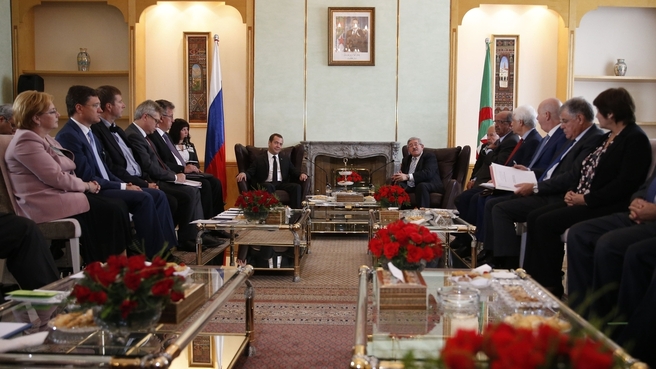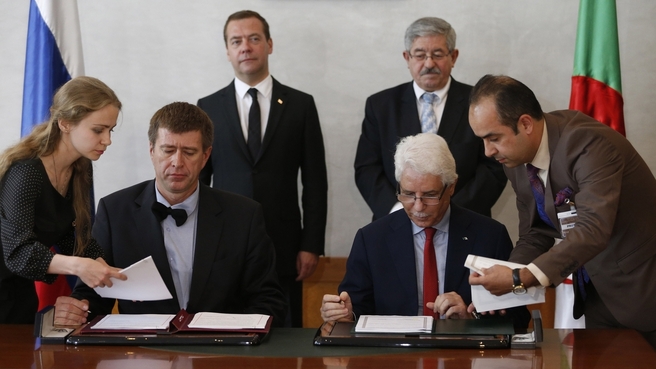As part of his visit to the People's Democratic Republic of Algeria, Dmitry Medvedev held talks with Algerian Prime Minister Ahmed Ouyahia.
Documents signed following talks
News conference following Russian-Algerian talks

Russian-Algerian talks
Documents signed following talks:
– The Convention between the Russian Federation and the People’s Democratic
Republic of Algeria on mutual legal assistance in criminal cases
Signed by: Justice Minister Alexander Konovalov on Russia’s behalf and Justice
Minister Tayeb Louh on Algeria’s
behalf;
Visit
-
Dmitry Medvedev’s talks with President of Algeria’s Council of the Nation Abdelkader Bensalah
-
Dmitry Medvedev’s talks with President of Algeria’s National People's Assembly Said Bouhadja
-
Dmitry Medvedev’s talks with Prime Minister of Algeria Ahmed Ouyahia
-
Dmitry Medvedev’s talks with President of Algeria Abdelaziz Bouteflika
– Programme of cooperation between the Russian Healthcare Ministry and the Ministry of Health, Population and Hospital Reform of the People’s
Democratic Republic of Algeria
Signed by: Healthcare Minister Veronika Skvortsova on Russia’s behalf and Minister of
Health, Population and Hospital Reform Mokhtar Hazblawi on Algeria’s behalf;
– Executive programme in vocational training between the Ministry of
Education and Science and the Ministry
of Professional Education and Training of the People’s Democratic
Republic of Algeria
Signed by: Deputy Minister of Education and Science Lyudmila Ogorodova on Russia’s
behalf and Minister of Training and Professional
Education Mohamed Mebarki on Algeria’s
behalf;
– Memorandum on cooperation between Joint Stock Company Transneft and the
Sonatrach National Company for Research, Production, Transport, Transformation,
and Commercialisation of Hydrocarbons
Signed by: Transneft Vice President Mikhail Margelov on Russia’s behalf and Sonatrach
Chief Executive Officer Abdelmoumen Ould Kaddour on
Algeria’s behalf;
– Memorandum of understanding between Rosatom State Atomic Energy Corporation
and Algeria’s Nuclear Energy
Commissariat on cooperation in the training of nuclear energy professionals in
the People’s Democratic Republic of Algeria
Signed by: Rosatom Deputy Director General for International Relations Nikolai Spassky
on Russia’s behalf and Head of Algeria’s Nuclear Energy Commissariat Nasreddine Djoughri on Algeria’s behalf.
Also, the signing of the following document was announced:
– Memorandum of understanding between Closed Joint-Stock Company BIOCAD and
BIOMAD s.p.a. on
cooperation in the People’s Democratic Republic of Algeria
Signed by: BIOCAD President Dmitry Morozov on Russia’s behalf and BIOMAD CEO Mohammed Amin Courabi
on Algeria’s behalf.
News conference following Russian-Algerian talks
Excerpts from the transcript:
Ahmed Ouyahia (via interpreter): Mr Prime Minister, Algerian and Russian journalists.
Please let me once again welcome the Prime Minister, who has come to Algeria on a very important visit, as well as his delegation. This is the first visit of the head of the Russian Government since 1971. Bilateral relations were given a new start in 2001 when President of Algeria Abdelaziz Bouteflika and President of Russia Vladimir Putin signed a declaration on the strategic partnership of the two countries.
Today’s visit of Mr Medvedev is taking place in the context of the recent eighth session of the Russian-Algerian intergovernmental commission. This event laid the groundwork for our current talks, which were very productive. The talks resulted in the signing of several agreements on cooperation in healthcare, hydrocarbons, professional training and civilian nuclear power. In addition, today we mapped out new plans for cooperation in mining, industry, agriculture, tourism and higher education. All this contributes to the implementation of the decisions of the Russian-Algerian intergovernmental commission that held its meeting in September.
We agreed that a delegation of public and private Algerian companies will soon travel to Russia on a business mission to continue talking with their Russian business colleagues. I would like to thank Mr Medvedev for his visit once again.
Thank you very much.
Dmitry Medvedev: Mr Prime Minister, colleagues, members of the media, I would like to begin by thanking all our Algerian colleagues and Mr Ouyahia personally for the warm welcome. This is not our first meeting. I fondly remember my visit in 2010.
Today we have had, as usual, an open and constructive discussion of all the issues the Prime Minister has just mentioned. It is indeed a dialogue of equal partners, who share a desire to foster warm relations. The documents we have signed today are a good impetus for our joint work.
The range of agreements and the opportunities they create is very broad, as the Prime Minister has just said. They include energy – various areas of the energy sector in fact – mining, and industrial cooperation. And we have just signed for the first time an agreement on pharmaceuticals. This is just a fraction of the opportunities that exist at the moment.
Today we have discussed agricultural cooperation. We also touched on education projects – a very important aspect of our cultural relations ongoing for almost 55 years now – and signed a corresponding agreement.
All the measures we have agreed should be implemented, and the Russian government will take all the steps needed for that.
The intergovernmental commission will continue its work. We are waiting for the business mission from Algeria to implement these agreements in practice, at the company level. All this will be done.
I would like to express my sincere gratitude to all our Algerian friends and the Prime Minister personally for the warm welcome and excellent working conditions.
Question (via interpreter): I have two questions about economic cooperation between Russia and Algeria. The first question is for Mr Medvedev. In what ways could Russia support Algeria’s efforts to diversify its economy, and what specific projects were discussed today?
My second question is for Mr Ouyahia. How could Algeria benefit from Russia’s experience in overcoming the recent economic crisis triggered by lower oil prices?
Dmitry Medvedev: How should the economy be diversified? Exactly as we discussed today, that is, by expanding cooperation with other countries, including Russia.
As far as I know, the vast majority of export revenue in Algeria comes from oil and gas exports. By the way, Russia faces similar challenges as well. So, we are interested in developing other areas of economic cooperation. The agreements that we signed today are designed to achieve precisely this goal. I already mentioned the pharmaceutical industry. I believe this area is exceptionally important for possible future cooperation. The Prime Minister mentioned tourism. Today, we also discussed developing cooperation in the sphere of train car production. There is already a good project for using the Russia-made automotive bodies which are then used in Algeria to assemble motor vehicles. All of that is not related to petroleum or hydrocarbon revenue. As a matter of fact, this is what diversification is all about. We will follow that path.
Ahmed Ouyahia (via interpreter): With regard to your second question – how can we use Russia’s experience in overcoming the crisis – I think the answer should consist of two parts.
The first part concerns the place occupied by the ancient and great Russian nation. The Algerian people should follow its example when it comes to overcoming crises. I think that all the necessary components (I’m referring primarily to the cohesion of the Algerian people) are available.
With regard to the second part of the solution, Mr Medvedev has already mentioned it. This concerns cooperation between Russia and Algeria. As we proceed to diversify the Algerian economy, this is how we can look for new sources of revenue, create new jobs and generate more revenue from both external and domestic sources. It is in this vein that we will cooperate in the future.
Question: Alexandra Cherepnina, Channel One.
Russia and Algeria are members of the OPEC+ ministerial committee for monitoring compliance with the agreement on cutting oil production. Of course, during today's talks, you discussed in detail compliance with the Vienna agreements, since the hydrocarbon sector is important for the economies of both Russia and Algeria. Earlier, Minister of Energy Novak was in Algeria and spoke with the country's leadership. Are Russia and Algeria on the same page regarding the steps that need to be taken to stabilise the oil market?
Dmitry Medvedev: Yes, our positions on limiting oil production and the so-called Viennese process coincide. As you may be aware, a letter signed by the President of Algeria Abdelaziz Bouteflika regarding the need to discuss this matter was one of the critical prerequisites for starting the talks on this issue. This is how the Viennese process came about.
We are doing our best to contribute to it. We believe that the agreements that have been reached are effectively working. They allow us to keep oil prices within certain reasonable limits. They also create additional opportunities for growth in our economies. We continue to discuss these issues with other countries.
Monitoring is a no less important issue, and we are dealing with it with our partners. We look forward to continuing this work with our Algerian friends. We hope that ultimately these decisions will contribute to the overall stabilisation of hydrocarbon prices and provide opportunities for revenue generation for the budgets of the countries that are largely dependent on oil and gas.
Ahmed Ouyahia (via interpreter): I fully agree with what my colleague said. In addition, I would like to note the high quality of our dialogue, the traditional dialogue between Russia and Algeria on all aspects of this matter. Our vital interests in this area coincide. I’m referring to hydrocarbons which form the basis of the Algerian economy and are of great importance for the Russian economy.
Algeria was there at the origin of these efforts, as Mr Medvedev said. I’m referring to the message that President Bouteflika sent to President Putin in early 2015. Similar messages were sent to the heads of a number of other oil-producing states.
Russia played an enormous role in mobilising other countries, especially those outside OPEC, to support these efforts. All this ended in 2016 with the signing of the Vienna agreements. Now, the discussion continues, and the dialogue on implementing this agreement and compliance guarantees goes on.
We have high hopes for the outcome of the dialogue that took place in Moscow recently. I’m referring to the meeting between President Putin and Saudi King Salman bin Abdulaziz Al Saud. For us, hydrocarbons are a vital area of our economy, and we hope to see further implementation of the agreement to reduce production in order to bring hydrocarbon prices to reasonable levels. We hope that this process will continue in the future.










